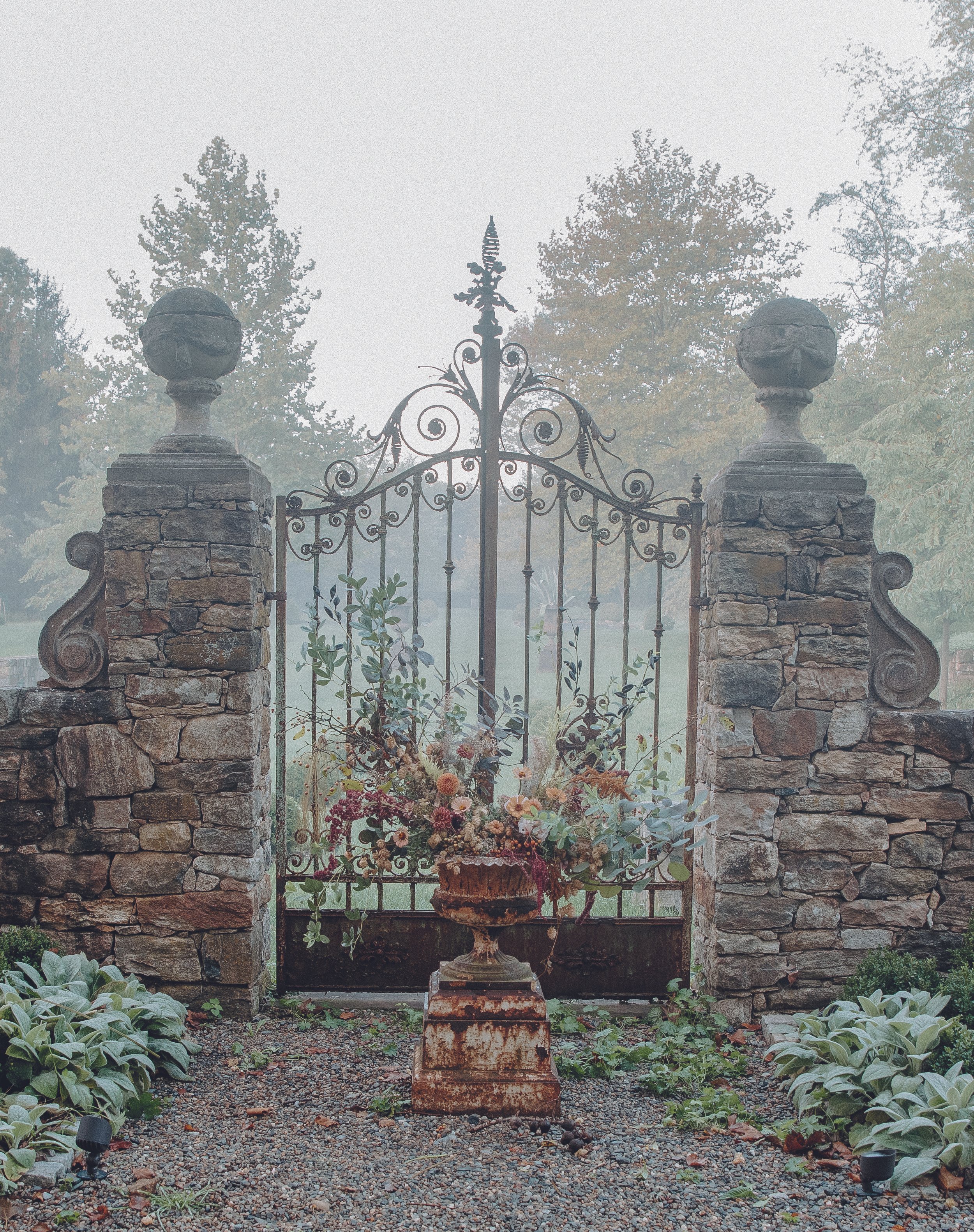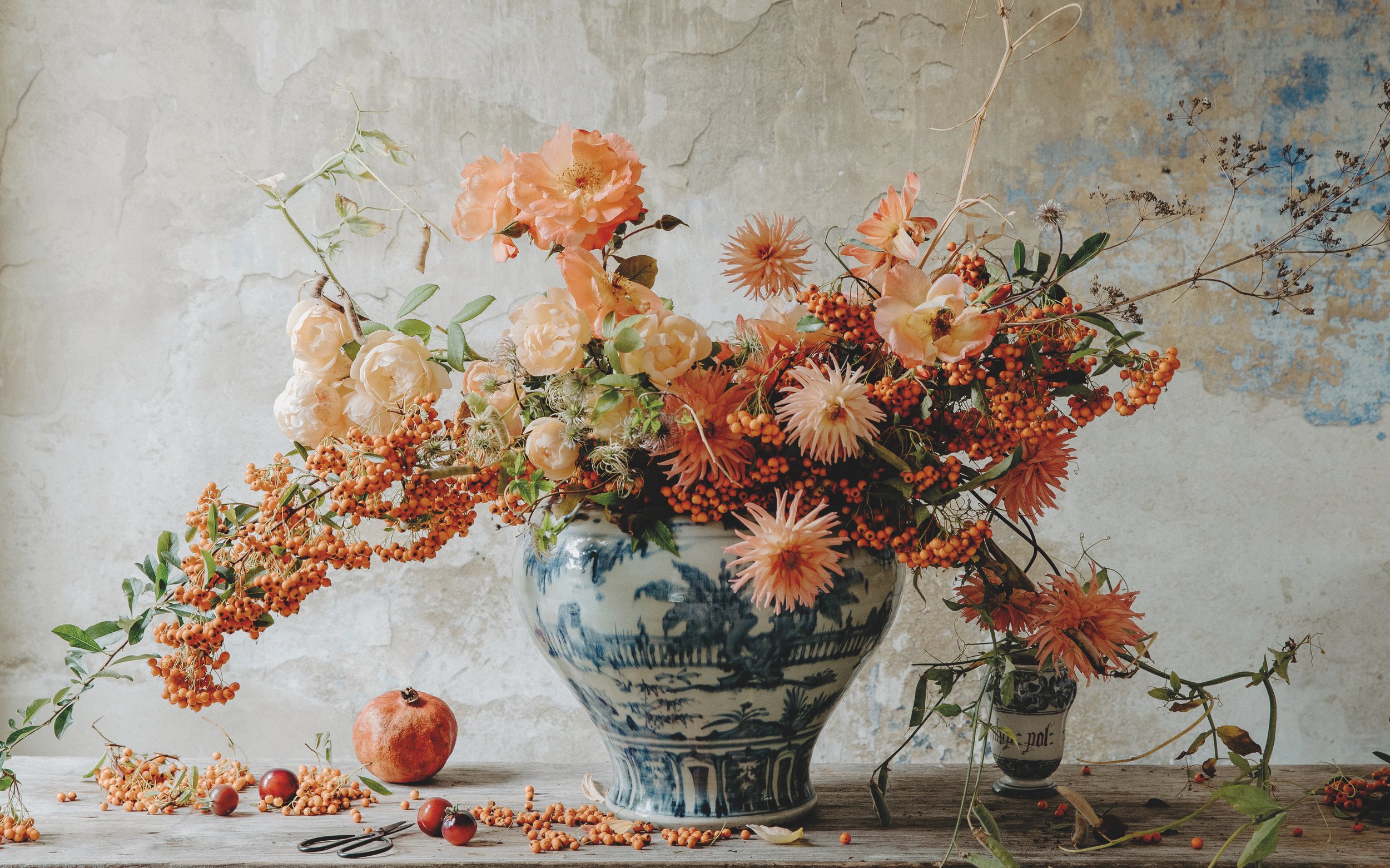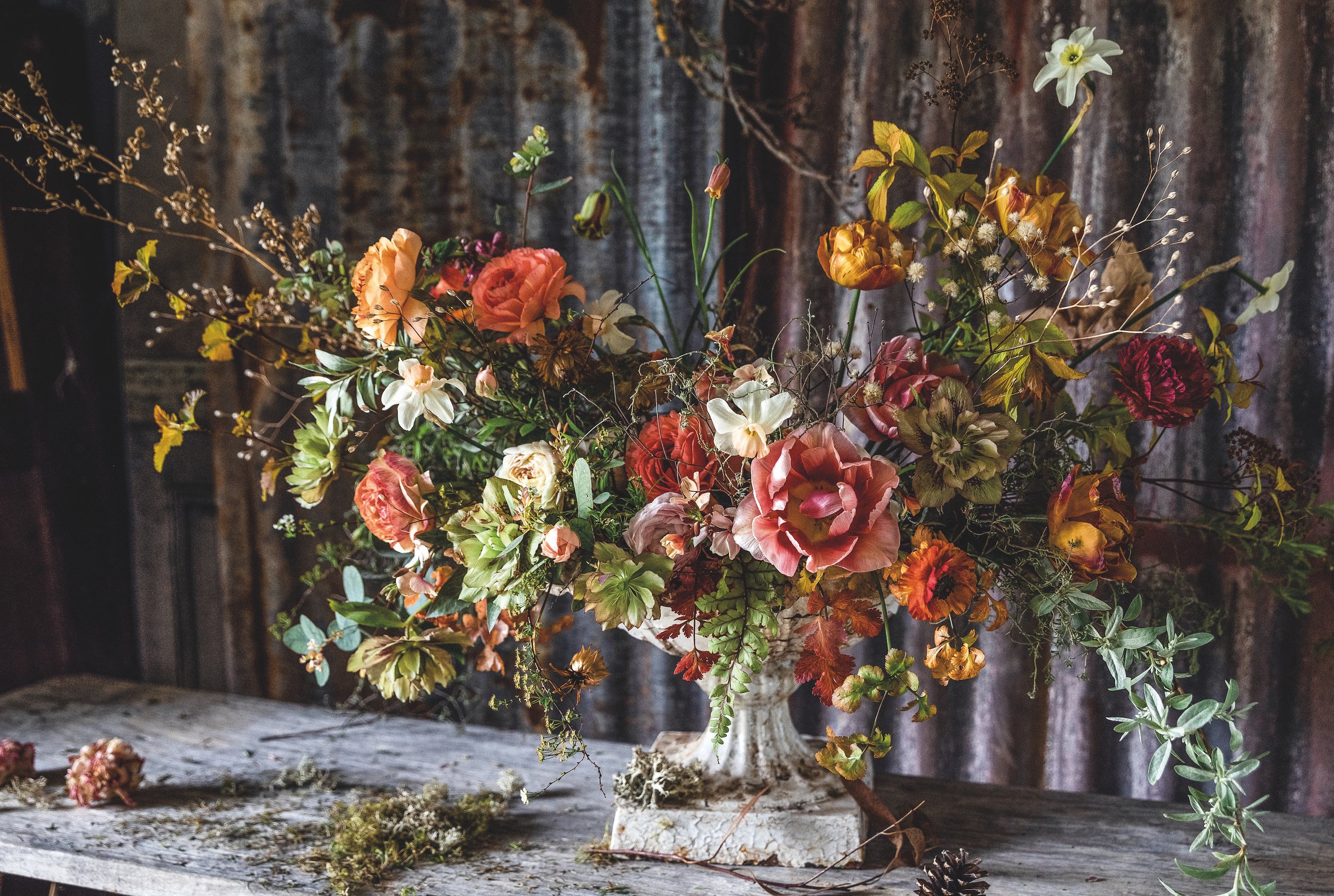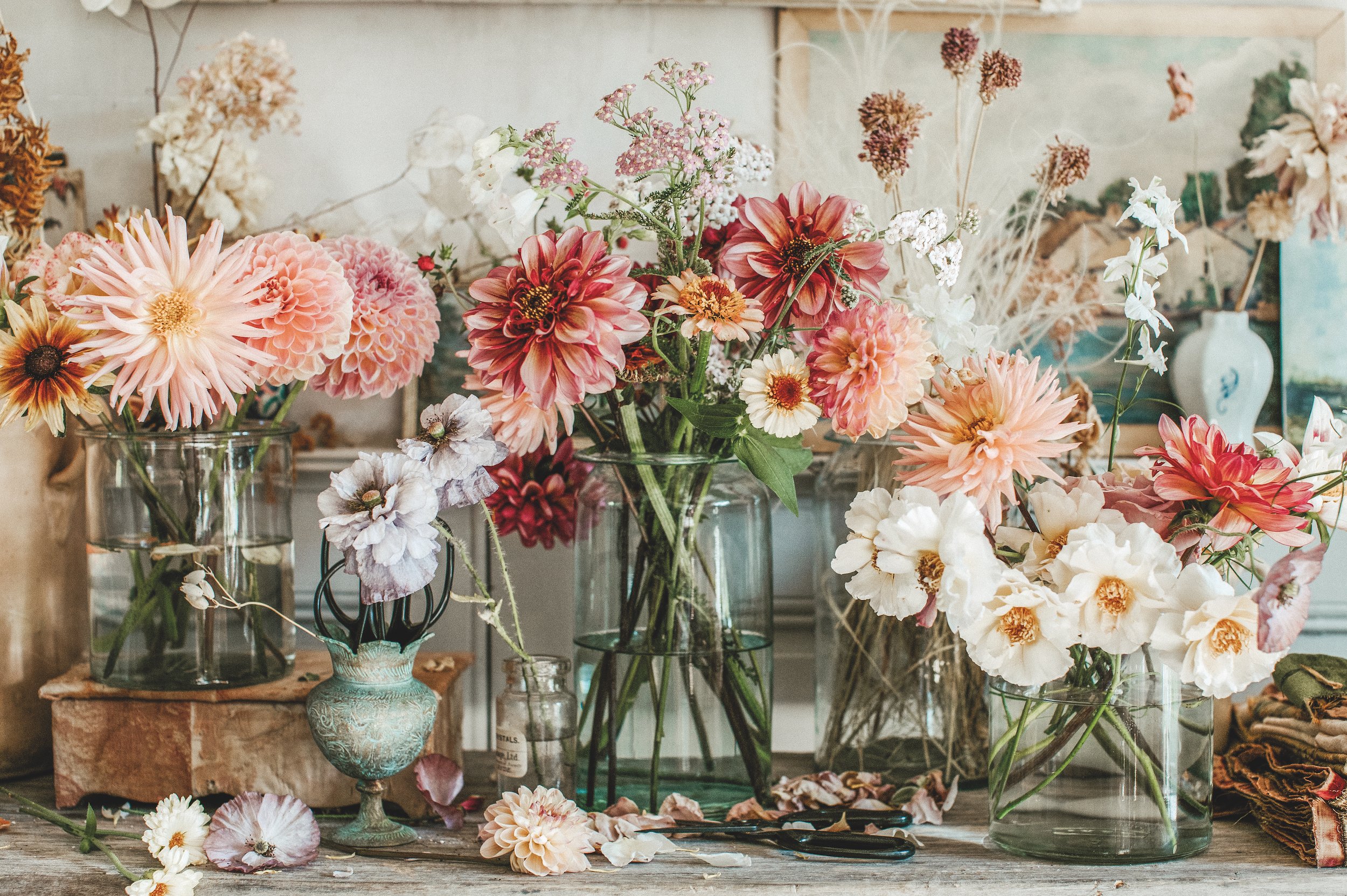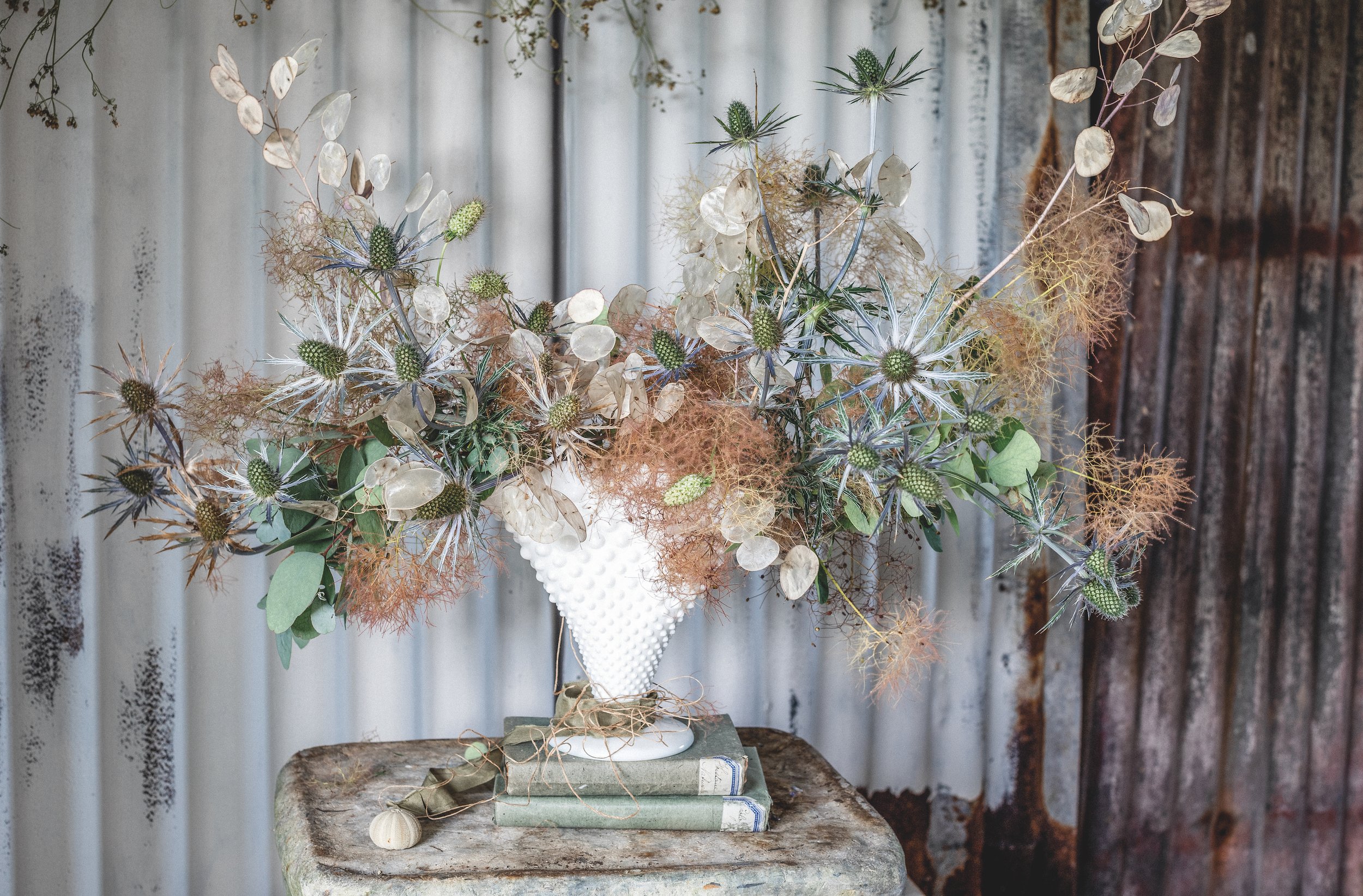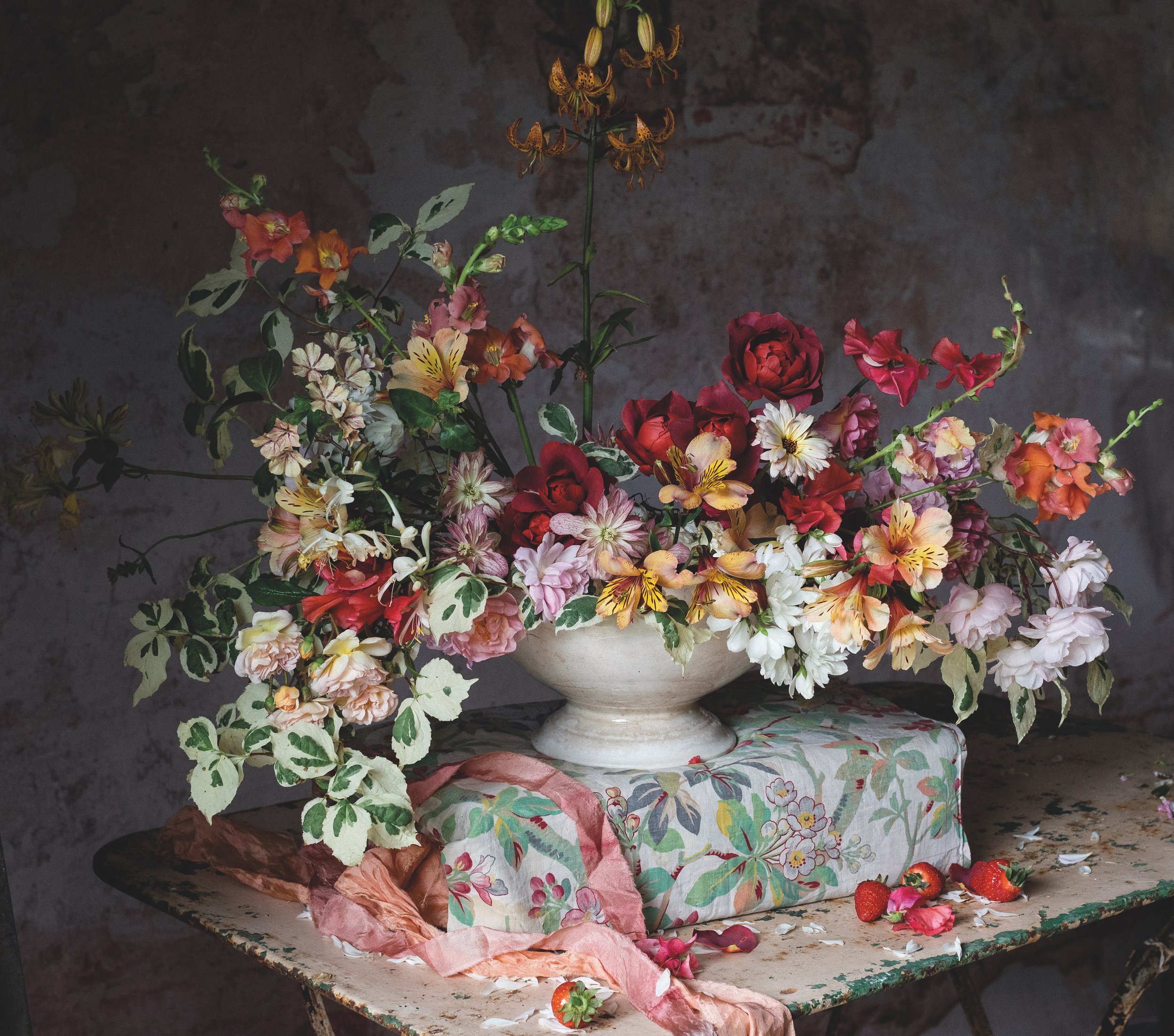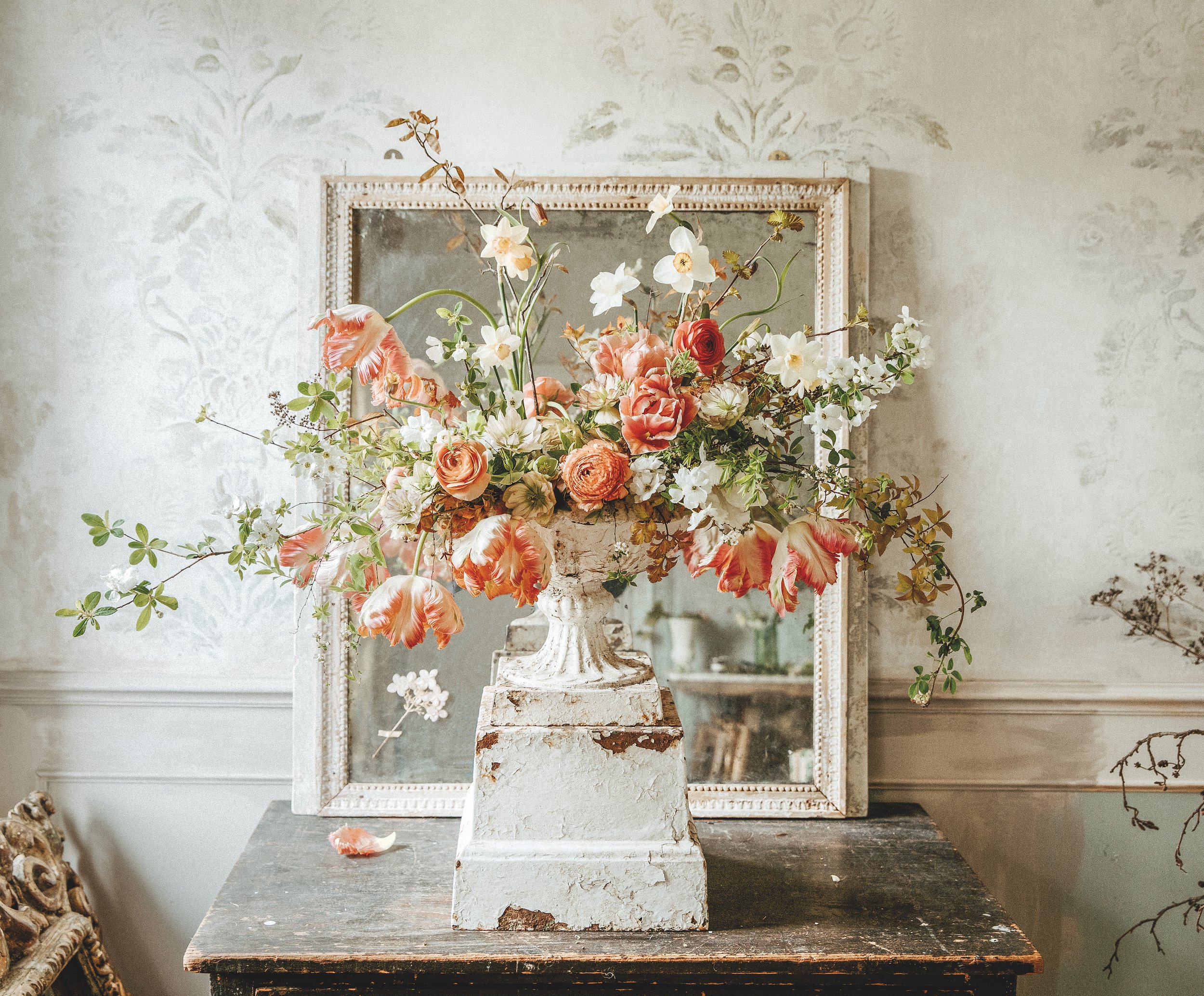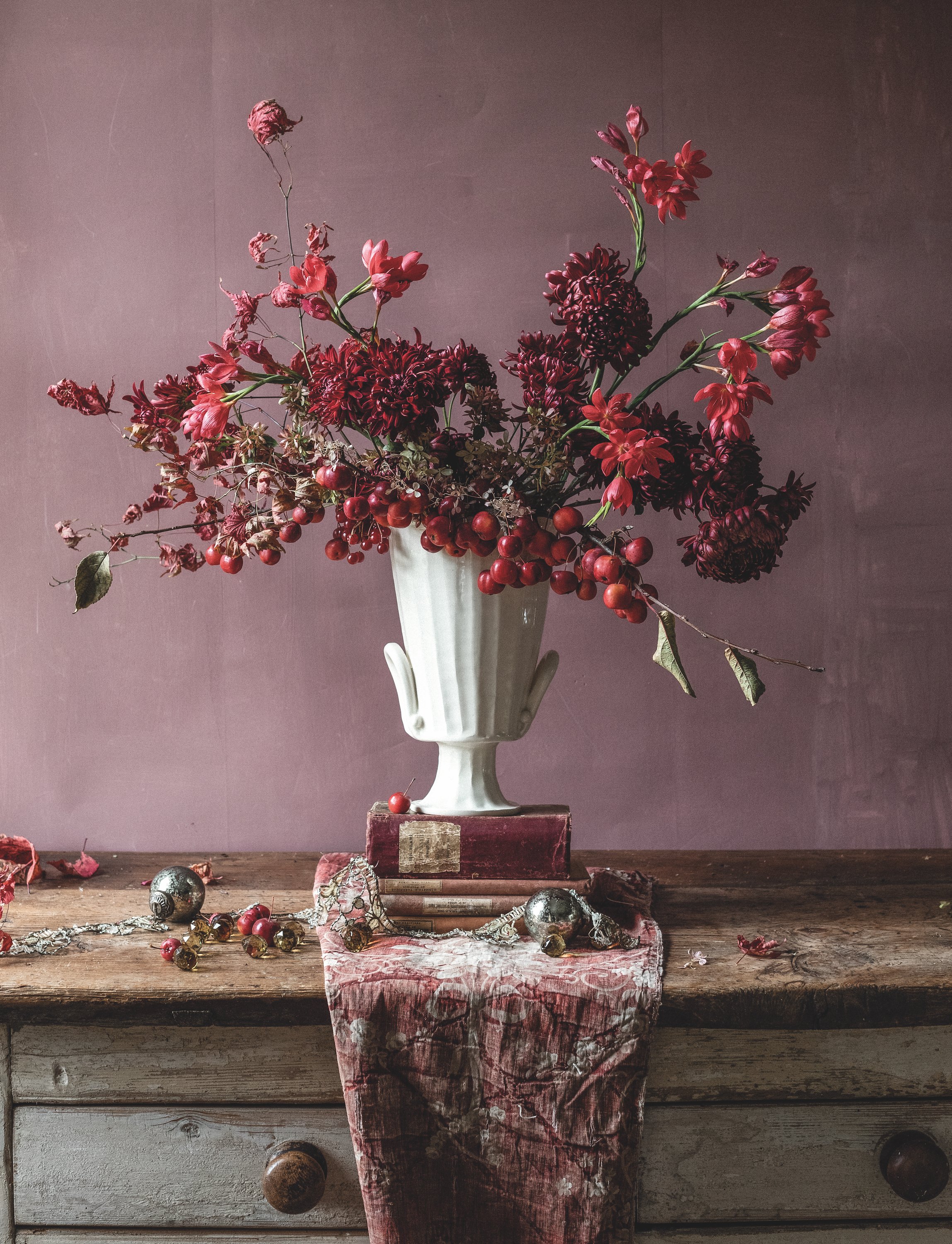What Landscapes Teach Us About Design: Lucy Hunter Mixes The Natural World With Bold Structure
In this episode of the Slow Style Home podcast, I talk with Lucy Hunter, a floral artist and landscape designer who finds inspiration in nature and brings it into her home. She discusses the importance of working with materials that aren't considered perfect and creating stunning arrangements that showcase the unique qualities of each bloom. Lucy's passion for the slow flower movement and her love for nature have led her to create meaningful designs using dramatic forms of structure to offset the organic shapes she creates with flowers. She also shares insights into her eclectic personal style and how she incorporates her love for antiques and storytelling into her home. If you're a design enthusiast seeking inspiration from nature and floral arrangements, this episode will provide you with valuable design lessons and encourage you to bring the outside in. So grab a cup of tea, sit back, and get ready to be inspired by Lucy's creative journey.
KEY TAKEAWAYS
I've learned a few things from Lucy Hunter:
lessons from natural landscapes can be applied to our interior spaces
floral arrangements are not separate from the experience we're creating in a room
adding a great deal of natural elements in your home doesn't mean it has to look like an overgrown garden
When we talk about “mastering the mix” in our homes, we’re not just talking about mixing old + new or high/low. There’s a powerful mix to be found in mixing structure with free form, free flowing organic shapes.
Lucy Hunter is a highly accomplished garden and landscape designer with over 20 years of experience in the industry. Throughout her career, Lucy has honed her skills and developed a deep understanding of the intricate relationship between nature and design. Her expertise in floral arrangements and her passion for incorporating natural elements into home decor have made her a sought-after authority in the field. Lucy's book, The Flower Hunter: Creating a Floral Love Story Inspired by the Landscape, showcases her extensive knowledge and showcases her ability to seamlessly blend the beauty of nature with interior design. With striking visuals and insightful commentary, Lucy offers practical design lessons that can be applied to any home. For design enthusiasts looking to infuse their spaces with the serenity and elegance of the natural world, Lucy Hunter's book is an invaluable resource.
PHOTOS PROVIDED BY LUCY HUNTER
TIMESTAMPED SUMMARY
00:00:00 - Introduction
Zandra welcomes Lucy Hunter to the Slow Style Home Podcast and compliments her on her book, "The Flower Hunter."
00:00:31 - Lucy's Goal for the Book
Lucy explains that her goal for the book was to share her experience transitioning from a garden designer to a wedding florist after feeling burnt out in the landscape industry. She wanted to convey her love for flowers and the beauty of imperfections in nature.
00:03:05 - Self-Reflection and Direction
Lucy reflects on her burnout and feeling lost after completing a major landscaping project. She shares her struggle with self-reflection in a male-dominated industry and her decision to explore a career in wedding floristry.
00:05:28 - Discovering a New Perspective
Lucy discusses her initial shock at the separation between cut flowers and the beauty of nature. She shares her realization that the cut flower industry prioritizes longevity over the natural imperfections and scents of flowers. She also mentions her discovery of the slow flower movement on Instagram.
00:08:19 - Becoming a Floral Artist
Lucy expresses her fascination with floral artists who bring the outside in and arrange with imperfect materials. She discusses her involvement in the slow flower movement and her commitment to creating art with flowers.
00:15:26 - Finding Joy in Organizing and Design
Lucy Hunter shares how organizing and putting her belongings in cabinets brings her joy and helps her switch off from the world. She emphasizes the importance of creating clear spaces and bold structures in design to appreciate the beauty of individual items.
00:18:58 - Mixing Old and New
Lucy Hunter discusses her love for mixing old and new elements in her home. She values having a firm structure with clear spaces while also incorporating bold and organic shapes. This approach allows for a balance between history and creativity.
00:21:12 - Staying True to Yourself
Lucy Hunter encourages people to be true to themselves when designing their homes. She believes in creating spaces that please the individual living in them, rather than following trends or seeking to impress others. Age has brought her the freedom to embrace her own style.
00:22:03 - The Value of a Home
Lucy Hunter reflects on the value of her home, which she describes as her most significant investment. She explains how the location and atmosphere of her house bring her a sense of peace and fulfillment, making it worth every penny.
00:25:09 - The Slow Flower Movement
Lucy Hunter introduces the concept of the slow flower movement, which promotes the idea of using fewer imported flowers and focusing on locally grown, scented, and meaningful blooms. She values the fleeting beauty and sensory experience of flowers over mass-produced and scentless alternatives.
00:30:12 - Valuing Personal Preferences
The speakers discuss the challenge of determining personal value in a world influenced by external factors like Amazon. They emphasize the importance of individual exploration and conversation to determine personal values.
00:30:31 - Book Description
The guest describes her book as a coffee table book filled with stunning floral and landscape photos. However, she emphasizes that the book also contains meaningful words that can inspire readers to reflect and find inspiration.
00:31:00 - Appreciation for the Book
The host expresses her admiration for the book and appreciates the combination of beautiful visuals and thought-provoking words. She looks forward to sharing the book with others.
00:31:14 - Gratitude
The guest expresses her gratitude for the host's kind words and appreciation of her work. She acknowledges the significance of having her book in the world and is thankful for the reception it has received.
FULL TRANSCRIPT
00:00:00
Lucy Hunter. Welcome to the Slow Style Home Podcast. Thank you for having me. Lovely to be here. Good.
00:00:08
I'm looking at this beautiful book that I have in front of me. It's called The Flower Hunter, creating a floral love story inspired by the landscape. And it is beautiful. Not just the photographs, which are really gorgeous and inspiring, but you're writing is beautiful as well. And I was really drawn in by a lot of what you were saying.
00:00:31
And I'm going to start by asking you, what was your goal for the book? What was your hope? What was the thing you were really trying to get across? Why did you write the book? So maybe it would help to sort of explain to your listeners, who don't know who I am at all, that I've been a garden designer, landscape designer for 20 years.
00:00:50
That's kind of my proper job, if you like. And so I've spent a large amount of my life outside in the garden on creating spaces, but I ended up my jobs became bigger and bigger. I started with nothing, but it was sort of I've worked through the 20 years, ended up with some very wealthy clients, fantastic budgets, huge jobs, and I ended up about 2013, with an enormous job for a client who basically bought 27 acres of potato fields and told me to make him a park for him and his new wife. Make me a park, Lucy. That was a pretty good brief and you don't get many of those, I can promise you that.
00:01:35
I basically could do whatever my dreams so it's like a dream job. And so we did, we made him a park and it took four years and we did two two acre lakes and woods gardens, formal gardens, toprid gardens, the whole lot. It was incredible. Brought in enormous number of mature trees and I learned an enormous amount. But at the end of that job, I had gone from being somebody that adored gardens, adored flowers, which is what had taken me into being a garden designer and a creative in the first place.
00:02:10
But I just felt completely burnt out and a bit lost.
00:02:16
I wasn't sure I even really liked landscaping anymore very much. Wow. And I think it was because I'd spent four years trying to get 30 male landscapers on site to do what I wanted them to do, rather what they wanted to do, especially on a Friday afternoon, and looking at spreadsheets and all that kind of thing. That then comes with running a big business, which has become but you so quickly, without looking, your creativity just kind of wafts at the door. Interesting.
00:02:45
And it's only when actually the whole thing starts to come to an end. And literally, I'd ignored everything else, because right, I was just concentrating on that and I suddenly thought, oh, my goodness, I'm not sure what I want to do now at all. I don't even know if I really like trees anymore. Which is really sad. Really sad, yes.
00:03:05
And something you never thought you would ever say to yourself, ever. This is a very important job that clearly has had a lot of self reflection happening because of it. Huge amount. And I wasn't used to that. I wasn't used to being self reflecting.
00:03:27
I work in a very male industry, or I had at that point. And we don't take to introspection very much or at least talk about it. We just kind of get on with it. And then I was sort of not sure where my direction was going, but a bit caught at the same time because obviously that business that I had spent so long was making money. I need to earn money.
00:03:51
So if I wasn't going to do that, then what was I going to do? But then a really silly thing. It was over dinner one night. It was a family dinner. I was with my sister, and she'd been with her boyfriend partner for, oh, gosh, 1516 years and decided they were going to get married finally.
00:04:08
And so it was going to be it was in a little country house hotel up in the northeast of England. Really beautiful, but not a huge budget at all. So they gave out jobs. We were all going to get a job. So my husband got the cakes, which was interesting.
00:04:22
Yeah. Not a natural baker, a cook, but. I would have called him a baker. They were good. He rose to the occasion and then she said, right, Lucy, you can do the flowers.
00:04:32
And I suddenly thought, oh, my goodness. Oh, I really fancy this. I really fancy doing flowers. Why have I not thought of this before? And it seemed like such an obvious thing.
00:04:43
But to me, at that point, flowers had always very much been out in the garden. They were outside. Right? It's so funny. Of course she wanted you to do the flowers.
00:04:55
And it's so funny how kind of separated you were from even that idea. I mean, obviously it clicked right away, but that's so I guess when you are that, especially after this huge project, you're that immersed in a much larger scale, right? You're talking about vistas and you're talking about finding pathways and little nooks to come sit and buy a little fountain or a brook. I mean, that's so much the scale is huge, as opposed to thinking about an arrangement that's in a vase. I think that's exactly it.
00:05:28
And I think that was the problem. I'd stopped looking at the detail. I'd stopped looking at that really small detail, but sometimes you can't see what's in front of your face and it was just this sort of throwaway comment. So I was like, right, that's it? I'm going to become a wedding florist.
00:05:42
Forget the garden design. The landscapers can stay with their toilet humor in their cabins. They can stay there and I'm going to go and waft with the flowers and the females and it's going to be so much nicer. So that's what I decided to do. So I thought, well, OK, I better go and learn how to be a florist.
00:05:59
Obviously you have to learn how to be a florist. Actually, you don't, but at that point I thought you did. So I wafted off down to London to go to the big floristry schools down there and I was really shocked, actually, because I had in my head that it was all going to be basically bringing the outside in and it really wasn't at all. I was just shocked at actually how I felt. There was such a separation in that cut flowers almost weren't seen as growing things, but that sounds really strange.
00:06:34
Yeah. No, keep going. Well, to me, a garden, and maybe this is just because it's how I, all my life been outside, but to me, the beauty in the flowers were the imperfections, the frost nibbled petals, the things that make it real. Yes. The roses that are just you can't pass without sticking your nose in and taking a great big because they just smell so fantastic.
00:07:00
Right. And yet I was now faced with these buckets of roses that were as stiff as pool cues and had been bred for longevity. Right. The suppliers were basically the breeders over the years have taken away the scent because it's the scent that makes the rose decay. Got it.
00:07:22
It's trying to trap the bees. Yes, of course. Right, that makes sense. So they're taking that out so that the flowers last longer. Okay.
00:07:29
So they last longer. So they'll last two, three weeks in the vase, which is what the consumers have wanted. They want value for money. Right. But in that time, we just seem to have lost, or certainly the cut flowers just lost anything that made them real.
00:07:46
It just felt so stagnant for me and I felt really sad about that and I thought, well, maybe I'm not going to be a wedding florist, then maybe this is my career, I'm going to have to go back to the landscape straight away. But then I sort of discovered instagram. So this would have been 2017, maybe. So Instagram was still instagram is a funny old beast, isn't it? It is, yes.
00:08:07
It changes at the minute. At the time, it was still quite fresh and nice. Right. And I made a little less commercialized. A little less, exactly, yeah.
00:08:19
And I always feel that I can't mock it too much because it has changed my life hugely, so I have a real love hate relationship with it. But I started going on it and realized that there were these I don't know if they would even call themselves florists. I certainly wouldn't call myself florists, but these people that were floral artists, that were literally were bringing the outside in and arranging with stuff that wasn't perfect from the outside. And I thought, that's what talks to me. Right?
00:08:52
So I sort of started to follow these people, and a lot of them were American florists. Okay. And the slow flower movement and became completely involved. And I spent some money and I went on a few workshops to meet people, and it suddenly became hugely consuming. I'm just so happy that you told us sort of this kind of backstory about where your philosophy is coming from and your passion and your commitment to the designs that you've created.
00:09:22
I think I did post about you recently speaking of instagram, and I can't remember if I said this in the post or not, but what I took away from this book was that you truly are an artist that uses flowers as your medium, almost like you're painting with them. I mean, when you are creating a display, let's say the choice of pot, the choice of flowers, the choice of where each flower is in its lifespan, because I think some of your flowers are bright and fresh and clearly just picked, and then others are sort of almost on their way out. And then it's also the movement that you're creating with sort of the organic shape of the branches or the drooping leaves or the arching flower. And then it's sort of the scene in which it is placed. And that could be the way the light's coming in through a window, which is going to change throughout the day.
00:10:27
And so therefore, this creation that you've had has many different looks to it, and therefore, as a viewer, you experience it different ways. And so I'm so glad you told us your thought process and where this is all coming from. I feel like what we're going to get from you is this, which is what I really am always after, which is this sense that who we are is really the line is very blurry between who we are and how we're represented in our environment. It's so intertwined. Absolutely.
00:11:00
Your book really epitomizes that. So let me just ask you a couple of things. Could you describe your style? If I had never been to your home or been to your garden, what would I see? How would you describe how you show up in your home or in your gardens?
00:11:17
Eclectic, probably. I'm a collector. My father is an antique dealer. So I've always grown up with, again, the imperfect. My grandmother was a gardener, so that's that kind of strand as well.
00:11:32
And we were lucky enough to do a bit of a grand design on our home around 2012. So it was a crumbling wreck on the side of a mountain, literally, honestly, which we turned into a home. So I do feel that we now live in a house that really represents us. I'm always sort of arranging I collect things wherever I go. We're just walking today, the dogs at lunchtime, and there's a sweet chestnut tree down the bottom and all the spiny chestnuts, but I couldn't resist as a child.
00:12:09
Do you ever pick up the conkers and the sweet Chesters? In my 50s, I'm still wanting to pick up those, so I picked up those. And then I'll collect patterns and old textiles that just catch my eye. Anything that's got a bit of history to it, I think anything that's got a potential story. And I think that reflects me because I think, at the end of the day, I am a storyteller.
00:12:36
I'm always curious about the life that's had whether that's the tree that's been standing for 350 years, which blows your mind, and what they've seen, or whether it's a really old piece of French linen that's possibly been around for the last 150 years as well. That's incredible. I collect and I think our home is layered and everything's got a reason it's there. I'd like to think so everything has to be loved or lots of patterns, and they're things that inspire me. The flowers then started to, I think, possibly make me a better designer, a garden designer.
00:13:20
And the garden design made me a better floral artist, whatever you call me. And the whole thing started to inform each other. Yeah, the way you've organized this book, we haven't even talked about that. Just to remember the subheading. The subtitle of the book.
00:13:37
Floral love story inspired by the landscape. So the way the book is organized is into countryside and meadows, the coast, cities and towns, the forest and mountains. And so you are clearly inspired by nature, and clearly that is something you're bringing into your home. That's a big part of your style. There's this other part of your book where there's a little part of a chapter that you labeled drama and you talked about yourself and how you love the shock of a fuchsia next to a viridian.
00:14:15
So I feel like that's showing up in your home as well. And that is a part of your style. And all of it was just so fun to read. And I wonder if I ask you what object or part of your home really embodies your style, your aesthetic? Tell us a little bit about this cabinet of curiosities because it's just a really fun part of the book.
00:14:38
So it's this huge, big, black, Napoleonic old cabinet with a big glass front in my studio. And when I first got it, I filled it full of fossils. I had this huge collection of fossils, and then I got a bit bored with that, so they went out and then, yeah, there's been various iterations of things that go into it, but at the moment, which is actually in the book, especially this time of year, now, drying flowers, so drying the dahlias. I had some incredible dried renunculus from my friend that grows flowers professionally. She'd had these beautiful renunculus, and they sort of dried into, like, tissue paper kind of sculptural, and I put them into pin frogs, tiny little pin frogs, and then just put them in my cabinet and they just make such a lovely display.
00:15:26
And the great thing is I can shut the door so they don't get too dusty. That kind of thing. Sure. I remember a really dear friend of mine came to stay probably a year ago or so, and she looked at my she said, Lucy, she said, I can tell you get so much pleasure from organizing and putting your stuff in the cabinet. I can just see you.
00:15:46
And she was so know it's how I switch know it's how I completely switch off. Know what? Can know any kind of we all have. Yeah. Could be the world event.
00:15:59
It could be your kids driving you crazy. It could be all of the above. Switch the news off, definitely, and shut myself away. It's such a silly thing, isn't it? But, I mean, if that's what actually makes you cheerful and keeps you going and keeps you creative, then why not?
00:16:20
Why not? It's a perfect background display piece. It's black, so the things that you put in there really kind of stand out against it. And I can see it filled with fossils, but the way it is now, it's like specimens. There's a lot of space around each vase, so every individual flower is sort of really appreciated.
00:16:45
And yeah, I think that absolutely embodies everything you're describing about yourself, which is a lovely thing to see. And I love that your friend noticed it and said, I can picture you enjoy putting it together. She knows me quite well, I think. Yeah, you talked a lot about old and you talked about story and history and all of that. And a lot of your vases or your containers, they're not even all vases meant to be vases have a lot of patina on them.
00:17:14
They're clearly old. Do you have anything new in your home? How do you mix things together? And it's fine if you don't. It's fine if you don't.
00:17:22
Yeah, I actually think it's really my father's an antique dealer and my mother was a dressmaker, but she's very practical woman, and I think I've got a mix of both of them, and I think it shows in the landscaping as well. I do like to have quite a firm structure to things. So the kitchen has an old sort of Jordan cabinetry, but it's modern, if you know what I mean. It's all very clean. I like the cabinet because it keeps that in the cabinet, but I don't like lots of clutter everywhere.
00:17:53
I try to have clear spaces and have big, bold background sure. Backbones bones to something. Yeah. So if I was designing a garden, for example, in a big landscape, I love sort of all this very wild rewilding the meadows and everything. But we've just done one for a lovely client this summer.
00:18:13
And we've used this incredible topery that some of them are about 40, 50 years old that we've brought in from Europe. And they're these topiary shapes in you, but they're so beautifully cut. Absolutely. The detail on them is incredible. And it's that structure, that bold structure that allows everything else to be a bit wild around know?
00:18:38
And I kind of think I'm a bit like that in the home. So, like, for example, for the cabinet of Curiosity, you've got this quite bold cabinet, but it allows the things inside can be a bit wafty and WiFi.
00:18:52
It's that boldness that holds everything else together.
00:18:58
We brought in because the house was a shell when we made it, but I wanted the doors to be very Georgian, but they're very clean, if that makes sense. They're very clean. I think if everything was very shabby, everything was peeling, all the walls were peeling, and I might start to feel a bit like Miss Havisham. I like things to be clean and give you a breathe. It's that negative space, isn't it?
00:19:23
It's that room to breathe so you don't feel overwhelmed. I'm so glad I asked you this question. I wasn't going to ask you, to be quite honest, because I thought, well, mixing old and new and she doesn't have a lot of new. No, but you've just pointed out that there's yet another way to talk about the mix, which is structure and free form, the boldness of the use of the topiaries, the boldness of the black cabinet, especially the way you have it now. Like I said, it's like you've got these specimens, right?
00:20:01
And it specimens, but the flowers themselves are then kind of crumbling out of the vases. So there's this structure, but then there's this organic shape that is about the cycle of life. That is such an interesting way to think about mixing things together. And I think you're absolutely right from a design perspective as well, when you give something some structure as the background, and especially in your case it tends to be bold structure, then you do have the room for the sort of more organic stuff to happen without it looking like a mess. I think that's really going to be helpful to people listening.
00:20:40
And I bring this up because that's something that people struggle with so much, is how to mix these things together. We're all drawn to so many different things, we're drawn to different styles, we're different color palettes and different moods and all of that. And I think trying to mix those parts of ourselves, those aspects of our personality or those sort of flights of fancy that we have is tricky. I think people struggle with it, so that's why I love to talk about it. I think it is tricky, but I think you have to be true to yourself, don't you?
00:21:12
I don't know.
00:21:15
I've never been very good at following trends or being told what to do at all. Yeah, I sort of go off on my own thing and do my own thing. But if it's your home, it's got to please you. You're living in it. And maybe that's an age thing.
00:21:31
Maybe it's something now that I have struggled with in the past, definitely. And I think maybe as a 30 year old, I think I was possibly sort of more of a people pleaser still. People pleaser, but more of a kind of somebody's going to come and see my home, then it has to look up to the latest trend or whatever. Now. I'm like, no, this is me.
00:21:53
This is me. Isn't that freeing and wonderful? I think, yes. It's a good thing about aging, for sure. Yeah, it has to be one good thing.
00:22:03
I'll take it. I'll take it's a good thing. All right, so this is a bit of a turn in the conversation. I just have one more question for you, which is, I've been thinking a lot lately about how we place value on things. There's so much in the world that we could spend our money on.
00:22:18
There are so many cheaply made things right now that are actually kind of cool looking, and so they're easy to grab and get our hands on. And then, of course, you've got the whole online world as well. And so I've been thinking a lot about what is something truly worth? Let's forget about the price tag. Just what is something truly worth?
00:22:35
And so I'm curious to know what's something that you spent the most amount of money on but that was truly valuable and worth it to you. This is a really difficult one, actually. I completely with you on the I don't like buying mass made. Anything mass made completely turns me off. I'm not interested at all.
00:22:57
I want things to be different and have that sense of history and age. I've got so many objects. I mean, that's just because I'm such a collector. Collector, yeah. But am I allowed to say my house?
00:23:11
I mean, gosh, we had a budget. It became more than double that, which, if we had known at the time, we wouldn't have done it. So thank goodness we didn't know. Yes. And my husband occasionally looks at me with that kind of wide eyed sort of, why have you talked to me into this huge mortgage?
00:23:31
Woman but as you come from Chester, we're very rural, as I said before. And you come over this sort of main road, and you come down we're, like, in a valley on the side of the hill mountain. And as you come over and you could have had, like, busiest day, manchester Airport's, about an hour, so you could know, just done a transatlantic flight or whatever, and you come over the hill into the valley, and I just always take this enormous breath and think, Goodness. And I don't know, it's really difficult to just identify one object, because I think it always one thing. And then the garden, I can't imagine not having a garden space at all.
00:24:19
And I know that we're so fortunate and privileged to live in this house. Yeah. If you're going to nail me down, I would have to say that it's. Been so worth it, I think. So worth it, because I can't imagine doing what I do now without it.
00:24:36
I mean, I'm sure I could. I mean, I'm sure if you had to, you would, wouldn't you? But I don't know, it's just part. Of me that makes so much sense. It really does.
00:24:46
My follow up question has to do with a comment that you sort of just sort of skipped over, which was the slow flower movement, and the name of the show is Slow Style Home. I mean, I'm clearly the slow movements of all kinds. Yeah, that's one that's new to me. Oh, really? I can guess at what it is, but can you please just tell us?
00:25:09
What is that? Well, yeah, the UK basically imports all our flowers we have done, and now we're really struggling because of brexit. That's a good idea, isn't it?
00:25:22
And we stopped growing. We just import from pollens. And it's the idea that, actually, we don't need as much, we can have less. And if we've got and my philosophy is and I always say to my students or people I'm talking to or her bride's mother, because I have done a few weddings, I would rather have bouquet of roses that even maybe a few of the petals fall off halfway down the aisle. But it smells absolutely exquisite and it lasts for 10 hours.
00:25:59
Right, but what an amazing 10 hours. And it's that kind of I would rather have that moment, that fleeting moment, any day, over something that's just feel bit sorry for it, really. But it has no scent, it has no personality, it has no story. It's just being highly bred. Yeah, right.
00:26:20
Mass market. We don't need that many blooms to create something incredible. We don't need thousands and thousands of roses for an event. And I think that's what I struggled with weddings, actually, was the amount of flowers that you need that are then thrown away, that are just used for 24 hours for an event and then put on the skip. Oh, my goodness.
00:26:43
That broke my heart. Right. Imagine. I didn't want to be in an industry like that. But if I can be in part of an industry where I'm encouraging people to maybe take time in the garden or with a window box or in the local park or wherever, just to see what's around you and stop because we're all so highly charged and on 100 miles an hour all the time.
00:27:12
But if you can just take if we can take a bit of pleasure from just having a coffee outside and just noticing something and then maybe having that buzz and just having one perfect moment on your desk or by your bedside table, then over something that's wrapped in cellophane and has come thousands and thousands of miles, then I know I would choose. So that's the slow flowers and that's know, everybody's trying in the UK now. We do have a lot more. We've got a corporation called Flowers from the Farm, okay. And it's basically it's all these very small growers.
00:27:50
So my friend who lives about an hour away, she just grows on an acre, so it's not huge. Right. She buys a lot of local florists with seasonal flowers. And she's pretty much stopped now because obviously we're now coming into late autumn. And also that's the other thing I haven't mentioned, really, is that seasonality.
00:28:10
So it's very much working with what is in season and trying to explain to clients and people that they don't need peonies in November. There's something else that's just as beautiful that we can use. Maybe it's that dried renunculus from spring. Right. So there is that aspect of it which is very similar to the slow food movement, which is about eating in season as opposed to trying to have a tomato in December.
00:28:39
That makes sense. The same holds true with flowers. All of this is actually making me think about tying this back to our conversation about value, which is you describe the bride walking down the aisle with the bouquet that is freshly picked. The scent that it only lasts for 10 hours. Maybe some of the petals are falling off.
00:29:01
But the scent, it's about the moment. Because think about how much scent informs our memory. And for that bride, that scent is going to bring her right back to that moment every time she smells it. And that's so much more meaningful than not even remembering what flowers you had as you were walking down the aisle. Right.
00:29:22
And to me, that's a way of placing value on something that's more valuable than having the bouquet that lasts for two weeks, even though we've sort of been trained to think, well, I'm going to pay more for the bouquet that lasts two weeks.
00:29:38
I think it's trying to all we can do is talk. I think about it. And it's trying to educate I don't know if that's the right word, but it sounds a bit patronizing, but it's trying to reeducate on, as you say, the value of things and what is the value. And I think as a society, over what, two, three generations we've been since the of the value is on.
00:30:12
I mean, yes, I don't ever want to be patronizing and I don't ever want to assume that I have all the answers or that I am somehow living in a way that's above all of this. I'm just as influenced by Amazon and by everything else going on. So I think you're right. I think that was well said. All we can do is talk about.
00:30:31
It because I think we're all trying to figure out for ourselves how do we personally, individually value something? Lucy, this has been such a wonderful conversation. I have thoroughly enjoyed it. And I'm very excited about sharing this book with everyone who's listening. Like I said, it's a bit know you're going to expect a coffee table book because it's about florals and landscapes and the photos are absolutely stunning.
00:31:00
But I was really taken with your words and I just feel like it's something that you can really sit with over a cup of tea and dip in and out of and get inspired by. So thank you so much for putting it into the world. No, thank you. That means a lot. Thank you.
00:31:14
Really appreciate that.




